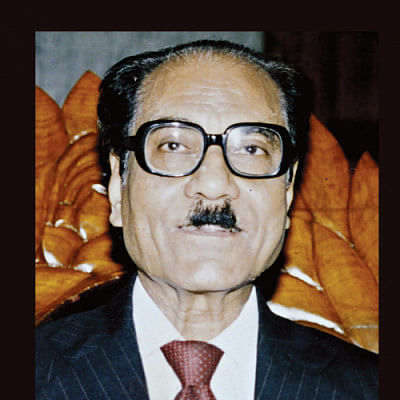A quiet champion of democracy

He played a pivotal role at the crucial juncture in the country's history, resolutely steering the nation's transition to parliamentary democracy from an autocratic rule.
In February 1991, Justice Shahabuddin Ahmed gave the nation what was until then an almost impossible dream -- a free, fair and peaceful election -- navigating the country out of the political quagmire it had fallen into after the assassination of Bangabandhu Sheikh Mujibur Rahman and subsequent military coups.
Serving as acting president and chief of an interim government of the country, he kept himself above controversies.
A man of integrity, former president and chief justice Shahabuddin died at a city hospital yesterday.
The 92-year-old ex-president had been suffering from old-age complications for a long time. He was admitted to a hospital at the end of last month, said his son-in-law Prof Ahaduzzaman Mohammad Ali.
He left behind two daughters and two sons. His wife passed away years ago, and one of his daughters, Sitara Parvin, died in a road accident in Chicago, USA.
His first namaj-e-janaza was held at his ancestral village in Netrakona yesterday.
Shahabuddin will be buried at the capital's Banani graveyard today after another namaz-e-janaza at the National Eidgah, said Ahaduzzaman.
A pall of gloom descended on the political arena after the news of his death spread.
President Abdul Hamid, Prime Minister Sheikh Hasina, Chief Justice Hasan Foez Siddique, several ministers, political parties, distinguished personalities, and top leaders of different socio-cultural organisations expressed deep shock at the demise of the former president.
Publicity-shy all his life, Justice Shahabuddin was picked by all political partiesto head the non-party interim government that would oversee the 1991 parliamentary election.
The general election was very important for restoration of democracy in the country, as it was the first election after the fall of then military dictator HM Ershad in the face of the movement by opposition political parties.
After the fall of Ershad on December 6, 1990, then vice-president Moudud Ahmed stepped down and then chief justice Shahabuddin was appointed to the post. Consequently, Ershad resigned and handed over power to Shahabuddin who became the head of the government as acting president.
Shahabuddin took charge of the affairs when almost all democratic institutions were in bad shape. He left the office of acting president on October 9, 1991 when there was an elected parliament as well as parliamentary system of government in place.
During that period, the country saw parliament passing the 12th amendment of the constitution, reintroducing parliamentary democracy.
Shahabuddin played an effective role in ensuring the independence of newspapers by amending several laws, including the Special Powers Act.
He issued an ordinance named "The Printing Presses and Publications (Declaration and Registration) Amendment Ordinance, 1991" with the provision of the Press Appellate Board, for settling the appeals against the deputy commissioner's decision on cancellation of declaration and registration of newspapers.
Following the 11th amendment to the constitution, Shahabuddin returned to his previous post of chief justice. He retired as chief justice on February 1, 1995.
After the Sheikh Hasina government was formed in 1996, he was elected president unopposed having been nominated by the ruling Awami League in October. He tenure ended on November 11, 2001.
Since then, he had been living a very secluded life at his home in the capital's Gulshan.
Shahabuddin earned the love, respect, and admiration of all due to his neutral and conscientious roles in all state affairs during the five years of his presidency.
Born on February 1, 1930 in Netrakona, Shahabuddin joined the Civil Service of Pakistan (CSP) in 1954. He was transferred to the judicial branch in June 1960.
He became a judge of the High Court of Bangladesh in January 1972, and subsequently, was appointed as a judge of the Appellate Division of the Supreme Court in February 1980. He was made chief justice in January 1990.
Shahabuddin was the chief of the Commission of Enquiry formed to investigate the causes of police firing on agitating students of Dhaka University in 1983, which led to the deaths of several students. His report, however, was never made public by the then government.
He served as chairman of the Labour Appellate Tribunal (1973-74) and chairman of the Bangladesh Red Cross Society from August 1978 to April 1982.
A great number of Shahabuddin's verdicts have been reported in the Dhaka Law Reports, Bangladesh Legal Decisions and Bangladesh Case Reports. His verdict on the 8th Amendment of the Constitution of Bangladesh was hailed as a landmark in the constitutional development of the country.


 For all latest news, follow The Daily Star's Google News channel.
For all latest news, follow The Daily Star's Google News channel. 




Comments